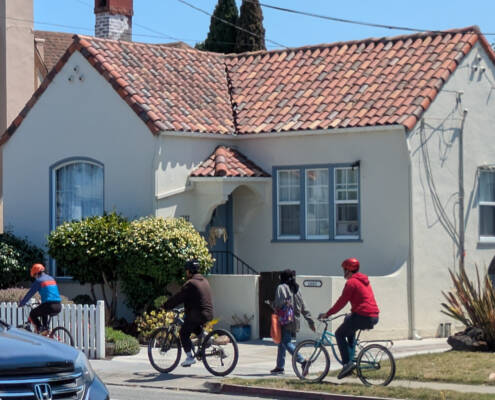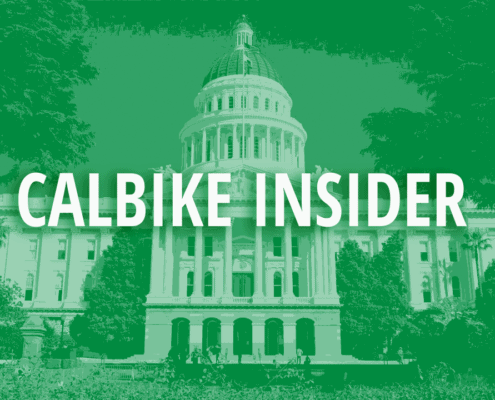
© California Bicycle Coalition 2025

1017 L Street #288
Sacramento, CA 95814
© California Bicycle Coalition 2025
CalBike was a co-sponsor of the Complete Streets Bill of 2024, SB 960, authored by Senator Scott Wiener. The bill requires Caltrans to set objective goals and “to prioritize the implementation of comfortable, convenient, and connected facilities for pedestrians, bicyclists, and transit users on all projects in the [SHOPP funding] program, where applicable.” The bill was approved by the legislature and signed into law by Governor Gavin Newsom. CalBike continues to work with Caltrans and other state agencies to help guide implementation of the new law.
Complete Streets are streets that are safe and comfortable for people biking, walking, and taking transit, as well as driving motor vehicles. Protected bikeways, a key element of many Complete Streets, have been shown to reduce fatalities and injuries for road users in all modes of transportation.
People who get around by biking, walking, or taking transit have the same right to safe passage on our streets as people driving cars. True Complete Streets provide that equitable use of our public space regardless of transit mode, economic status, or race.
While Caltrans has made incremental progress in adding more bike- and pedestrian-friendly features to its repaving projects, there is a need for greater oversight and accountability. The agency’s Complete Streets checklists treat any element that makes biking or walking even marginally safer as a “Complete Streets” feature, ignoring the fact that a single crosswalk or “Share the Road” sign is often not enough to create a Complete Street.
In 2017, a CalBike-commissioned poll showed that Californians across the state and across all major political and demographic groups support building Complete Streets—roads with safe sidewalks, visible crosswalks, and protected bike lanes—that are safe places for everyone and not strictly thoroughfares for driving.
Together with our ally Senator Scott Wiener (D-San Francisco) and over 80 co-sponsors and supporters, CalBike sponsored SB 127, the Complete Streets for Active Living Bill, in 2019. The bill would have required Caltrans to follow its own Complete Streets Policy and prioritize the safety of everyone who uses our roads, not just drivers, on every repaving, maintenance, and rehab project. Despite overwhelming support in the legislature and from constituents, Governor Gavin Newsom vetoed the Complete Streets Bill in 2019.
In 2023, CalBike joined with over 100 mobility, climate justice, and transportation organizations to send a letter to Governor Gavin Newsom, urging an independent investigation of Caltrans, a moratorium on freeway expansion, and better oversight of the agency.
In 2024, we were a sponsor of Senator Wiener’s Complete Streets Bill, SB 960, which became law in the fall of 2024. We also produced a report, Incomplete Streets: Aligning Practice with Promise in Caltrans Projects, which detailed the agencies failure to meet the safety needs of people who bike, walk, or take transit.
 https://www.calbike.org/wp-content/uploads/2025/09/sylwia-bartyzel-vQvzGsG3KWY-unsplash.jpg
4797
3198
Laura McCamy
https://www.calbike.org/wp-content/uploads/2018/07/calbike-logo.png
Laura McCamy2025-09-15 13:59:042025-09-15 13:59:05Bike-Friendly Bills Bite the Dust
https://www.calbike.org/wp-content/uploads/2025/09/sylwia-bartyzel-vQvzGsG3KWY-unsplash.jpg
4797
3198
Laura McCamy
https://www.calbike.org/wp-content/uploads/2018/07/calbike-logo.png
Laura McCamy2025-09-15 13:59:042025-09-15 13:59:05Bike-Friendly Bills Bite the Dust https://www.calbike.org/wp-content/uploads/2025/07/SR-61-bike-riders.jpg
1475
2617
Laura McCamy
https://www.calbike.org/wp-content/uploads/2018/07/calbike-logo.png
Laura McCamy2025-07-23 02:06:102025-07-23 02:06:11Adding Bikeways to State Routes: Two Local Advocates Share Strategies for Change
https://www.calbike.org/wp-content/uploads/2025/07/SR-61-bike-riders.jpg
1475
2617
Laura McCamy
https://www.calbike.org/wp-content/uploads/2018/07/calbike-logo.png
Laura McCamy2025-07-23 02:06:102025-07-23 02:06:11Adding Bikeways to State Routes: Two Local Advocates Share Strategies for Change https://www.calbike.org/wp-content/uploads/2021/05/CalBike-Insider-Image4.png
720
1280
Jared Sanchez
https://www.calbike.org/wp-content/uploads/2018/07/calbike-logo.png
Jared Sanchez2025-07-22 12:55:302025-07-23 02:01:17CalBike Insider: Updating Bike Parking in Green Building Codes
https://www.calbike.org/wp-content/uploads/2021/05/CalBike-Insider-Image4.png
720
1280
Jared Sanchez
https://www.calbike.org/wp-content/uploads/2018/07/calbike-logo.png
Jared Sanchez2025-07-22 12:55:302025-07-23 02:01:17CalBike Insider: Updating Bike Parking in Green Building Codes
© California Bicycle Coalition 2025

1017 L Street #288
Sacramento, CA 95814
© California Bicycle Coalition 2025

Governor Newsom Signs SB 960, the Complete Streets Bill
/by Brian SmithFor Immediate Release: 9/27/24
Contact: Jared Sanchez, policy director, CalBike (714) 262-0921, jared@calbike.org
SACRAMENTO – Governor Gavin Newsom has signed the Complete Streets Bill, SB 960, authored by Senator Scott Wiener (pictured above) and sponsored by CalBike, SPUR, AARP California, and others.
The Complete Streets Bill will require Caltrans to consider the needs of people riding bikes, walking, and taking transit on our state roadways, many of which serve as local streets. Caltrans policy mandates this, but the agency often doesn’t follow through.
SB 960 will increase accountability by requiring the agency to set targets for active transportation improvements in State Highway Operation and Protection Program (SHOPP) projects and add elements for people biking, walking, and taking transit when it repairs roadways. It will also establish a transit priority policy, placing greater emphasis on transit improvements on state roadways.
Complete Streets are safe and comfortable streets for people biking, walking, rolling, and taking transit, as well as driving motor vehicles. Protected bikeways, a key element of many Complete Streets, have been shown to reduce fatalities and injuries for road users in all modes of transportation.
“Californians who get around by biking, walking, rolling, or taking transit have the same rights to safe passage on our streets as people driving cars. True Complete Streets provide equitable use of our public space regardless of transit mode, economic status, or race,” said Jared Sanchez, policy director for CalBike. “The Complete Streets Bill becoming law today moves us closer to the day when California state routes are among the safest streets in our communities, rather than the most deadly.”
Background
CalBike sponsored SB 127, the Complete Streets for Active Living Bill, in 2019. The bill would have required Caltrans to follow its own Complete Streets Policy and prioritize the safety of everyone who uses our roads, not just drivers, on every repaving, maintenance, and rehab project. Despite overwhelming support in the legislature and from constituents, Governor Gavin Newsom vetoed that Complete Streets Bill.
In 2019, Caltrans had a new leader and the governor stated in his veto message that he wanted to give the agency a chance to reform its practices without legislative oversight.
Five years on, CalBike examined Caltrans’ record and found that, while there are some positive changes, more needs to improve safety for people who bike, walk, and take transit.
Read CalBike’s recent Caltrans series “Incomplete Streets.”
###